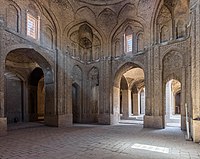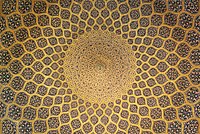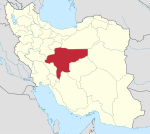Isfahan province
Isfahan Province
Persian: استان اصفهان | |
|---|---|
 Location of Isfahan Province within Iran | |
| Coordinates: 32°40′N 51°55′E / 32.667°N 51.917°E[1] | |
| Country | Iran |
| Region | Region 2 |
| Capital | Isfahan |
| Counties | 28 |
| Government | |
| • Governor-general | Mehdi Jamalinejad |
| Area | |
• Total | 107,018 km2 (41,320 sq mi) |
| Population (2016)[3] | |
• Total | 5,120,850 |
• Estimate (2020) | 5,343,000[2] |
| • Density | 48/km2 (120/sq mi) |
| Time zone | UTC+03:30 (IRST) |
| Main language(s) | Predominantly Persian. small Minority: Bakhtiari Luri, Qashqai, Georgian, Armenian languages in some regions of the province |
| HDI (2017) | 0.830[4] very high · 3rd |
| Website | www |
| Year | Pop. | ±% |
|---|---|---|
| 1966 | 1,703,701 | — |
| 1986 | 3,294,916 | +93.4% |
| 2006 | 4,559,256 | +38.4% |
| 2011 | 4,879,312 | +7.0% |
| 2016 | 5,120,850 | +5.0% |
| amar.org.ir | ||
Isfahan or Esfahan/Espahan province(Persian: استان اصفهان)[a] is one of the 31 provinces of Iran. Its capital is the city of Isfahan.[5]
The province is in the center of the country in Iran's Region 2,[6] whose secretariat is located in Isfahan.
History
[edit]Historians have recorded Espahan, Sepahan or Isfahan initially as a defense and military base. The security and protection of the gradually increasing castles and fortifications, thereby, would provide the protection of residents nearby, therefore leading to the growth of large settlements nearby. These historical castles were Atashgah, Sarooyieh, Tabarok, Kohan Dej, and Gard Dej. The oldest of these is Ghal'eh Sefeed and the grounds at Tamijan from prehistoric times. The historic village of Abyaneh, a nationwide attraction, also has Sassanid ruins and fire temples among other historical relics.
During the 17th and 18th centuries, Isfahan province enjoyed high standards of prosperity as it became the capital of Safavid Persia. While the city of Sepahan (Esfahan) was their seat of monarchical, Kashan was their place of vacation and leisure.
Demographics
[edit]Language
[edit]First language in Isfahan Province[7]
A majority of the population speak Persian as first language with a minority of Luri, Turkic, Georgian, Biyabanaki and Armenian speakers.[7]
During the Pahlavi era, a large group of Kurds from the Gulbaghi tribe were moved from the north of Kurdistan province to the city of Isfahan and the cities of Yazd, Kashan, and Nayin. Today, the Gulbaghi tribe are mostly assimilated elements in the population of these cities.[8][9]
Population
[edit]At the time of the 2006 National Census, the province's population was 4,499,327 in 1,223,684 households, with a literacy rate of 88.65 percent.[10] The following census in 2011 counted 4,879,312 people in 1,454,162 households.[11] The 2016 census measured the population of the province as 5,120,850 in 1,607,482 households.[3]
Administrative divisions
[edit]The population history and structural changes of Isfahan Province's administrative divisions over three consecutive censuses are shown in the following table.
| Counties | 2006[10] | 2011[11] | 2016[3] |
|---|---|---|---|
| Aran va Bidgol | 89,961 | 97,409 | 103,517 |
| Ardestan | 43,585 | 41,405 | 42,105 |
| Borkhar[b] | — | 108,933 | 122,419 |
| Borkhar and Meymeh[c] | 277,783 | — | — |
| Buin Miandasht[d] | — | — | 24,163 |
| Chadegan | 33,684 | 33,942 | 32,479 |
| Dehaqan | 34,149 | 34,844 | 34,511 |
| Falavarjan | 232,019 | 247,014 | 249,814 |
| Faridan | 81,622 | 79,743 | 49,890 |
| Fereydunshahr | 38,955 | 38,334 | 35,654 |
| Golpayegan | 82,601 | 87,479 | 90,086 |
| Harand[e] | — | — | — |
| Isfahan | 1,963,315 | 2,174,172 | 2,243,249 |
| Jarqavieh[f] | — | — | — |
| Kashan | 297,000 | 323,371 | 364,482 |
| Khansar | 31,542 | 32,423 | 33,049 |
| Khomeyni Shahr | 282,888 | 311,629 | 319,727 |
| Khur and Biabanak[g] | — | 17,793 | 19,761 |
| Kuhpayeh[h] | — | — | — |
| Lenjan | 225,559 | 246,510 | 262,912 |
| Mobarakeh | 132,925 | 143,474 | 150,441 |
| Nain | 54,298 | 38,077 | 39,261 |
| Najafabad | 279,014 | 300,288 | 319,205 |
| Natanz | 43,947 | 42,239 | 43,977 |
| Semirom | 70,735 | 65,047 | 74,109 |
| Shahin Shahr and Meymeh[b] | — | 196,584 | 234,667 |
| Shahreza | 139,702 | 149,555 | 159,797 |
| Tiran and Karvan | 64,043 | 69,047 | 71,575 |
| Varzaneh[e] | — | — | — |
| Total | 4,499,327 | 4,879,312 | 5,120,850 |
Cities
[edit]According to the 2016 census, 4,507,430 people (over 88% of the population of Isfahan Province) live in the following cities:[3]
Geography
[edit]The Isfahan Province covers an area of approximately 107,018 square km and is situated in the center of Iran. To its north, stand the Markazi (Central) Province and the provinces of Qom and Semnan. To its south, it is bordered by the provinces of Fars, and Kohgiluyeh and Boyer-Ahmad Province. Aminabad is the most southern city of Isfahan province just 2 km north of the border. To the east, it is bordered by the province of Yazd. To the west, it shares its border with the province of Lurestan and to the southwest lies the province of Chahar Mahal and Bakhtiyari.
The province experiences a moderate and dry climate on the whole, ranging between 40.6 °C (105.08 °F) and 10.6 °C (51 °F) on a cold day in the winter season. The average annual temperature has been recorded as 16.7 °C (62 °F) and the annual rainfall on average has been reported as 116.9 mm. The city of Sepahan (Esfahan) however experiences an excellent climate, with four distinct seasons.
With an elevation of 4,040 metres, the Shahankuh is the highest peak in Isfahan Province. This mountain is located about 20 kilometres southwest of the city of Fereydunshahr in the western part of Isfahan Province.
Isfahan province has 52 rivers, mostly small and temporary, with the exception of the Zāyanderud, which totals 405 km in length a basin area of 27,100 km2.[18]
Biodiversity
[edit]Esmaeilius isfahanensis (Farsi: کپوردندان_اصفهان) is a species of Cyprinodontid fish endemic to the Zayandehrud river basin (see genus Esmaeilius). It is known only from three sites across the province.[19][20][21][22] Allium chlorotepalum is an endemic species of Isfahan province, Astragalus vernaculus is also common in the west of the province.[23][24]
Modern economy
[edit]Nine tons of saffron are produced by this province by the year.[25]
It is the biggest milk and dairy producer in Iran.[26]
High tech
[edit]The state has 18k active fiber optically connected network ports as of mid 2023.[27]
Military
[edit]Iranian armed forces and the Islamic Republic military has several locations inside Isfahan province, There is also Esfahan nuclear fuel research and production center nfrpc. Hesa specializes in aerospace and helicopter maintenance and weaponry.[28][29][30]
Tourism
[edit]Bridges
[edit]Main Isfahan attractions include
- Shahrestan bridge
- Khajoo (Khaju) Bridge in Isfahan
- siosepol or Si-O-Se-Pol bridge
- Choobi Bridge (Joubi Bridge)[31]
Cuisine
[edit]According to the Isfahan atlas[who?], well-known local dishes include Shefte, Kachi, Kebab Golpayegan, Samanu Shahreza, Carrot stew Khansar, Yokhe bread (Kaak) and Semirom.[32][33]
Education
[edit]As of 2023, fifty thousand foreigners were studying in schools in Isfahan province.[34]
Public universities
[edit]- Isfahan University of Technology
- Isfahan University
- Isfahan University of Medical Sciences
- Kashan University of Medical Sciences
- Isfahan University of Art
- Malek-Ashtar University of Technology
- University of Kashan
Islamic Azad Universities
[edit]Several well-known Islamic Azad University campuses in Iran are located in the province:
- Islamic Azad University of Falavarjan[35]
- Islamic Azad University of Meymeh
- Islamic Azad University of Kashan
- Islamic Azad University of Majlesi
- Islamic Azad University of Shahreza
- Islamic Azad University of Najafabad
- Islamic Azad University of Khomeynishahr
- Islamic Azad University of Isfahan[36]
- Islamic Azad University of Khorasgan[37]


Gallery
[edit]-
Cultural Heritage of Iran
-
Kashan is another cultural jewel of the province. Seen here is the Agha Bozorg Mosque.
See also
[edit]- Georgians in Iran
- History of Iran
- List of the historical structures in the Isfahan province
- List of cities in Isfahan Province by population
- Ostandari Isfahan
![]() Media related to Isfahan Province at Wikimedia Commons
Media related to Isfahan Province at Wikimedia Commons
Notes
[edit]- ^ Also romanized as Ostān-e Esfahān, Esfahan, Espahan, or Isphahan
- ^ a b One of two successor counties to Borkhar and Meymeh County after the census in 2006[12]
- ^ Split into Borkhar County and Shahin Shahr and Meymeh County after the 2016 census[12]
- ^ Separated from Faridan County after the 2011 census[13]
- ^ a b Separated from Isfahan County after the 2016 census[14]
- ^ Separated from Isfahan County after the 2016 census[15]
- ^ Separated from Nain County after the 2006 census[16]
- ^ Separated from Isfahan County after the 2016 census[17]
References
[edit]- ^ OpenStreetMap contributors (23 May 2024). "Isfahan Province" (Map). OpenStreetMap (in Persian). Retrieved 23 May 2024.
- ^ Amar. "توجه: تفاوت در سرجمع به دليل گرد شدن ارقام به رقم هزار مي باشد. (in Persian)". Archived from the original on 3 August 2020. Retrieved 29 September 2020.
- ^ a b c d "Census of the Islamic Republic of Iran, 1395 (2016)". AMAR (in Persian). The Statistical Center of Iran. p. 10. Archived from the original (Excel) on 19 October 2020. Retrieved 19 December 2022.
- ^ "Sub-national HDI - Area Database - Global Data Lab". hdi.globaldatalab.org. Archived from the original on 23 September 2018. Retrieved 13 September 2018.
- ^ Habibi, Hassan (21 June 1369). "Approval of the organization and chain of citizenship of the elements and units of the national divisions of Isfahan province, centered in the city of Isfahan". Lamtakam (in Persian). Ministry of Interior, Defense Political Commission of the Government Board. Archived from the original on 4 February 2024. Retrieved 4 February 2024.
- ^ "همشهری آنلاین-استانهای کشور به ۵ منطقه تقسیم شدند (Provinces were divided into 5 regions)". Hamshahri Online (in Persian). 22 June 2014 [1 Tir 1393, Jalaali]. Archived from the original on 23 June 2014.
- ^ a b "Language distribution: Esfahan Province". 2017–2020. Archived from the original on 11 April 2022. Retrieved 11 April 2022.
- ^ Ahmadi, Mansur (2022). "سیاست های ایلیاتی پهلوی اول برابر گلباغی ها". The Scientific Journal of Cihan University – Sulaimanyia. 6 (3): 391–404. doi:10.25098/6.3.21.
- ^ "کینه رضا شاه از طوایف و عشایر گهلواخی/ نه گلباغی ماند اینجا نه همدانی آنجا". 8 May 1402.
- ^ a b "Census of the Islamic Republic of Iran, 1385 (2006)". AMAR (in Persian). The Statistical Center of Iran. p. 10. Archived from the original (Excel) on 20 September 2011. Retrieved 25 September 2022.
- ^ a b "Census of the Islamic Republic of Iran, 1390 (2011)". Syracuse University (in Persian). The Statistical Center of Iran. p. 10. Archived from the original (Excel) on 17 January 2023. Retrieved 19 December 2022.
- ^ a b Davodi, Parviz (21 September 1386). "Approval letter of the ministers of the Political-Defense Commission of the Government Delegation regarding some changes and divisions of the country in Isfahan province". Islamic Parliament Research Center (in Persian). Archived from the original on 1 October 2015. Retrieved 9 June 2023.
- ^ Rahimi, Mohammad Reza (7 May 2013). "Six new cities and towns were added to the map of country divisions, with some changes in the geography of the seven provinces of the country". DOLAT (in Persian). Ministry of Interior, Board of Ministers. Archived from the original on 14 July 2014. Retrieved 12 June 2023.
- ^ Jahangiri, Ishaq (27 April 1400). "Approval letter regarding country divisions in Isfahan County, Isfahan province". DOTIC (in Persian). Ministry of Interior, Council of Ministers. Archived from the original on 30 November 2021. Retrieved 13 June 2023.
- ^ Jahangiri, Ishaq (26 September 2021) [Approved 27 April 1400]. Letter of approval regarding country divisions in Isfahan province. sdil.ac.ir (Report) (in Persian). Ministry of the Interior, Council of Ministers. Notification 46299/T58576H. Archived from the original on 28 March 2023. Retrieved 6 September 2024 – via Shahr Danesh Legal Research Institute.
- ^ Rahimi, Mohammad Reza (1 August 2009). "Khur and Biabanak County was added to the map of country divisions". Minister of Interior (in Persian). Ministry of Interior, Council of Ministers. Archived from the original on 4 March 2016. Retrieved 21 November 2023.
- ^ Jahangiri, Ishaq (31 July 2021). "Approval letter regarding country divisions in Isfahan County, Isfahan province". Islamic Council Research Center (in Persian). Ministry of Interior, Council of Ministers. Archived from the original on 28 August 2021. Retrieved 17 June 2023.
- ^ EIr and Xavier de Planhol, “ISFAHAN i. GEOGRAPHY,” Encyclopaedia Iranica, 2012. [1] Archived 2020-05-26 at the Wayback Machine.
- ^ Ghafouri, Zaniar; Keivany, Yazdan; Soofiani, Nasrollah M. (1 January 2019). "Reproductive biology of Aphanius isfahanensis in the Zayandehrud River, central Iran". Environmental Biology of Fishes. 102 (1): 19–25. Bibcode:2019EnvBF.102...19G. doi:10.1007/s10641-018-0833-0. ISSN 1573-5133. S2CID 53816219. Archived from the original on 20 December 2020. Retrieved 29 September 2020.
- ^ Zicha, Ondrej. "BioLib: Biological library". www.biolib.cz. Archived from the original on 4 March 2016. Retrieved 27 September 2020.
- ^ زانيار, غفوري; يزدان, کيواني; نصراله, محبوبي صوفياني (21 March 2018). "شاخص هاي تغذيه اي کپوردندان ماهي اصفهان (Aphanius isfahanensis) در رودخانه زاينده رود در ايران". Iranian Journal of Ichthyology (in Persian). 5 (3): 184–191. Archived from the original on 20 December 2020. Retrieved 29 September 2020.
- ^ "تنوع جمعیتی کپوردندان اصفهان (Aphanius isfahanensis)". www.virascience.com. Archived from the original on 20 December 2020. Retrieved 27 September 2020.
- ^ اخوان روفیگر, آزاده; باقری, علی; جمزاد, زیبا; جلیلی, عادل (2019). "The conservation status of two Allium )Amaryllidaceae( species in Iran". طبیعت ایران. 4 (1). doi:10.22092/irn.2019.118682. Archived from the original on 20 December 2020. Retrieved 6 October 2020.
- ^ اخوان روفیگر, آزاده; باقری, علی; جم زاد, زیبا; جلیلی, عادل (2020). "Conservation status of endemic species Astragalus vernaculus (Fabaceae)". طبیعت ایران. 4 (6). doi:10.22092/irn.2020.120810. Archived from the original on 8 October 2020. Retrieved 6 October 2020.
- ^ "برداشت زعفران از مزارع استان اصفهان". www.iribnews.ir. Archived from the original on 20 December 2020. Retrieved 17 November 2020.
- ^ "استان اصفهان؛ ستون خیمه امنیت غذایی کشور". 31 August 2022. Archived from the original on 1 September 2022. Retrieved 1 September 2022.
- ^ "۱۸ هزار پورت فیبرنوری در استان اصفهان به بهرهبرداری رسید". www.irna.ir. Retrieved 18 May 2023.
- ^ "Isfahan xiv. MODERN ECONOMY AND INDUSTRIES – Encyclopaedia Iranica". Archived from the original on 6 May 2023. Retrieved 18 May 2023.
- ^ "Isfahan xiv. MODERN ECONOMY AND INDUSTRIES ( – Encyclopaedia Iranica". Archived from the original on 26 May 2020. Retrieved 18 May 2023.
- ^ "Isfahan xiv. MODERN ECONOMY AND INDUSTRIES ( – Encyclopaedia Iranica". Archived from the original on 26 May 2020. Retrieved 18 May 2023.
- ^ "Isfahan Bridge - IsfahanMag". Retrieved 29 June 2023.
- ^ "آغاز تدوین اطلس غذایی استان اصفهان". www.iribnews.ir. Archived from the original on 20 December 2020. Retrieved 20 December 2020.
- ^ "تدوین اطلس غذایی استان اصفهان آغاز شد- اخبار اصفهان - اخبار استانها تسنیم - Tasnim". خبرگزاری تسنیم - Tasnim (in Persian). Archived from the original on 20 December 2020. Retrieved 20 December 2020.
- ^ "صدور ۱۸۰۰ شناسنامه برای فرزندان اتباع / ۵۳ هزار دانشآموز تبعه خارجی در اصفهان داریم - ایمنا". Archived from the original on 21 September 2023.
- ^ "Islamic azad university falavarjan branch". Archived from the original on 15 March 2015. Retrieved 6 March 2015.
- ^ "khuisf.ac.ir". khuisf.ac.ir. Archived from the original on 13 August 2013. Retrieved 11 August 2013.
- ^ "Islamic Azad University Isfahan (Khorasgan) Branch". en.khuisf.ac.ir. Archived from the original on 12 February 2013. Retrieved 27 March 2018.
Bibliography
[edit]- Albert Houtum-Schindler (1897). "Province of Isfahan". Eastern Persian Irak. London: J. Murray and Royal Geographical Society. pp. 119+. hdl:2027/mdp.39015000658461.
Further reading
[edit]- Muliani, S. (2001) The Georgians’ position in the Iranian history and civilization (Jaygah-e Gorjiha dar Tarikh va Farhang va Tammadon-e Iran) , Sepahan (Esfahan): Yekta
- Rahimi, M.M. (2001) The Georgians of Iran; Fereydunshahr (Gorjiha-ye Iran; Fereydunshahr), Sepahan (Esfahan): Yekta
- Sepiani, M. (1979) Georgian Iranians (Iranian-e Gorji), Sepahan (Esfahan): Arash
- Isfahan's tourist exhibition mentions the Georgians from Fereydunshahr and Fereydan. The report of this exhibition is available in the web site of the Iranian Cultural Heritage News agency. Archived April 3, 2007, at the Wayback Machine
- Saakashvili visited Fereydunshahr and put flowers on the graves of the Iranian Georgian martyrs' graves, showing respect towards this community. Archived November 29, 2005, at the Wayback Machine









